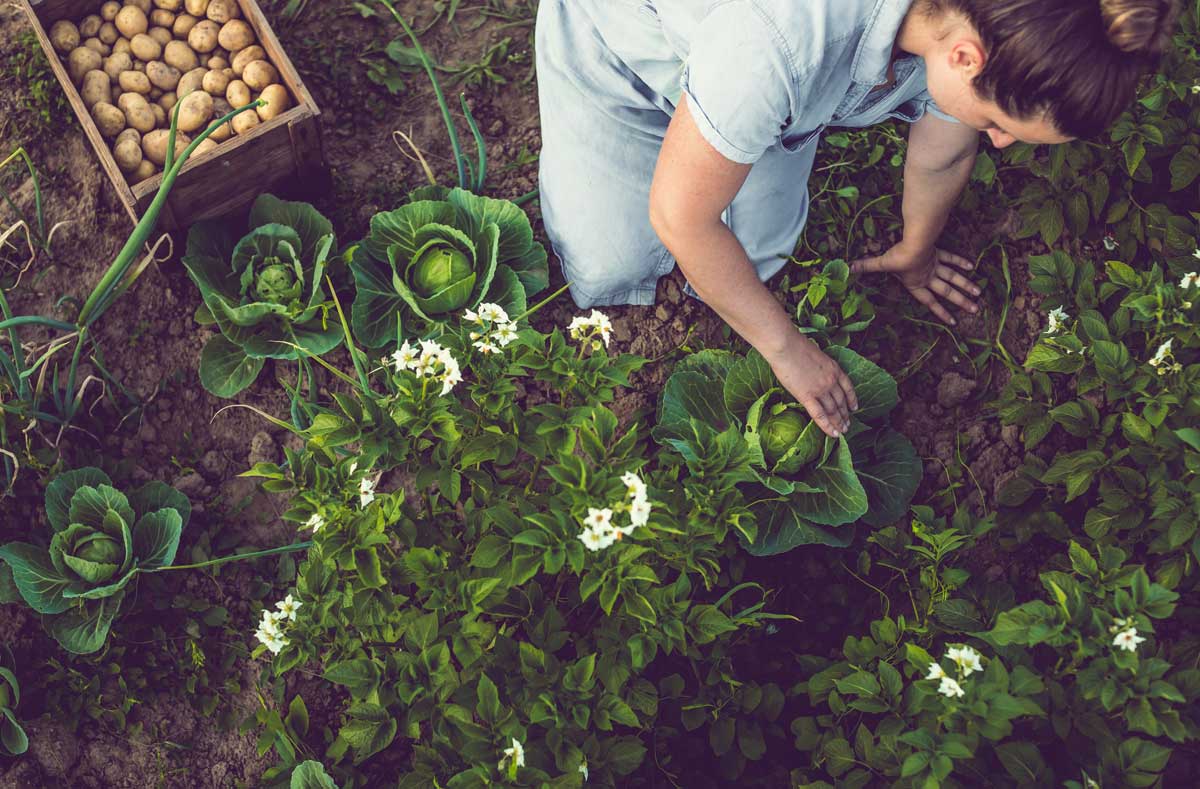View
Food for Thought
Rachel Lu on Growing Vegetables as a Primer in Moral Philosophy
I came late to the world of gardening. I had never grown so much as a radish until marriage and motherhood deposited me in a small, fenced backyard with an energetic toddler. At first I whiled away the hours reflecting on the academic papers I wasn't writing. When that became torture, I used physical labor as a distraction, pulling the weeds and clearing the overgrown beds. This left me with muddy, empty spaces that demanded to be filled. Before long, I found myself wandering through garden centers and investigating plant nurseries. By midsummer, the progress of my backyard plants had become a source of endless enjoyment for me and my son.
Gardening, as I discovered, is a wonderful primer in moral philosophy. It is a clear, tangible, and literally delicious way of experiencing the progression of created beings through their natural lifecycle. A well-tended garden offers resounding, joyful affirmation of the sturdy Aristotelian principle that optimal conditions enable living things to flourish. No one is a moral relativist when fertilizing his tomatoes.
A Moral Kindergarten
Being an amateur, I say all this a bit self-consciously, knowing that my appreciation of the horticultural world is still very slight. While staking my pepper plants and weeding my lettuce beds, I sometimes speculate: what would it be like to see these plants through the eyes of the true expert? Does the farmer spend his days contemplating the telos of corn and asparagus? Actually, I suspect that he does in a way, and that this deeper understanding of his land and crops is what sets the successful farmer apart from backyard tinkerers like myself.
It is with somewhat more confidence, however, that I can speak to the effects of gardening on people with whom I do share common ground: over-educated urbanites who have long relied on cold cereal and pre-packaged apple slices to fuel their pretentious reflections on modern life and society. For this group, gardening can indeed serve as a kind of moral kindergarten, presenting elementary lessons in a fresh and compelling way that even the worldly-wise can understand.
As evidence of this, I have been fascinated to note the incredible enthusiasm with which educated elites have embraced gardening in recent years. As other writers have noted, this zeal is sometimes taken to comical extremes, even becoming a kind of religion. Proponents of the "sustainable food" movement can become dreadfully stern as they sniff at our imported cheeses and warn us to eat our fresh and local greens. Any reasonable person would laugh at their agonized debates over which offerings of the seafood counter (if any) it is morally permissible for them to purchase, or at Zoe Bradbury's confession of the crisis of conscience she suffered after buying a (carbon-footprint-increasing) pineapple. To say that such people have lost perspective on life seems something of an understatement.
Still, we should not allow these farcical elements to obscure the more endearing side of food moralism. However foolish its excesses, it remains rooted in a healthy and natural enthusiasm, and this is no small thing. C. S. Lewis once remarked that the real challenge for today's educators lies not in cutting down jungles, but rather in irrigating deserts. He meant that, in the modern age, almost any natural pleasure is apt to be smothered by the deadening, joyless air of skeptical materialism. My experiences as a university instructor resoundingly affirm Lewis's sentiments. I will welcome almost anything that stands a chance of waking my students from that cold slumber of vulgarity in which so many seem to be lost. Since eating is a pleasure that even the basest among us can appreciate, and since food is a necessity that no one can avoid for long, it may be that gardens can serve as promising lifelines for rescuing the spiritually moribund.
A Testament to Health & Normalcy
To explain how this might work, I would begin by observing that gardening is an intrinsically youthful activity. It immediately disarms our more cynical impulses by throwing us into a world of childish pleasures: sun, wind, dirt and insects. Now the mother of three small boys, I appreciate even more how naturally these appeal to young minds, and how young hands start to quiver with anticipation at the very sight of a muddy plot squirming with earthworms. It may take adults a bit longer to capture the joy of dirt, but the experience of working with it is likely to be wholesome from the very start. It forces us to contend with something real, and after a job is finished, it rewards us with the satisfaction of having accomplished a concrete task.
As our garden begins to grow, more lessons unfold. Life is good. Health is preferable to sickness, and order to chaos. Prudent living yields beautiful, nourishing fruit. The obviousness of these truths should make them utterly redundant, but sadly, to the modern mind they are not obvious at all. Taught from youth to celebrate deviance and to sneer at normality, the modern gardener may find in his backyard vegetable plot an oracle of ancient wisdom, the likes of which he has never seen before. He is elated to see his seeds germinate, and, watching the tiny seedlings develop, he feels fully the preciousness of each new, developing leaf. Then, noting a purplish color on the underside of his tomato leaves, he anxiously begins checking sources: are they "supposed to" look like that? Heaven forbid they should depart from the path of thriving tomatohood!
When the fruits appear, the gardener is overcome with elation and gratitude. He probably feels some yearning to paint or photograph the splendid specimens, wondrous in their testament to the beauty of a successful life. He happily pores over recipes, treating his zucchini and sprouts like prized delicacies. He delights in giving away the excess to friends, feeling somehow that this triumph was made for sharing. And even if his friends are inclined to smirk a little, his enthusiasm is understandable. There, in the vegetable patch, he has been liberated from the prison of deviant "originality," and permitted at long last to celebrate the healthy and normal.
A Lifeline for the Unbeliever
As a rule, most zealous food moralists tend to be politically liberal unbelievers, and this is not surprising. I myself, as a mother and a Catholic Aristotelian, cherish my garden as a medium through which my children and I can enjoy life and beauty together, even before they are capable of putting our shared experience into words. For unbelievers, however, gardens may provide something much more essential: reassurance that objective goodness and thriving are possible. Those same solid Aristotelian principles that were dramatically expelled out the front door can now be re-admitted through the back gate, in the innocent guise of peppers and summer squash. For such people, gardens really may be a lifeline to a moral universe that they had dismissed as the stuff of legend and fairy tale.
Is it any wonder, then, that food moralism can take on the dimensions of a full-blown religion? Writers like Mary Eberstadt have done a fine job of showing the hypocrisy of people who obsess over the natural life cycle of chard while ignoring entirely the moral implications of abortion or IVF, and her scorn is understandable. In the trenches of deep and serious moral conflict, it is easy to become impatient with these flighty little putterers, who quite literally obsess over small potatoes while the world around them descends into chaos. But if, after all, the food moralist's glass is half-full, then perhaps it would be better to show patience. It may turn out that it is not possible to dwell among the lilies of the field without leaving oneself vulnerable to the realization that the world is full of the grandeur of God. •
Rachel Lu is a Senior Contributor at The Federalist, as well as a frequent contributor to Crisis Magazine, Ricochet and other publications. A convert to Roman Catholicism, she teaches philosophy at the University of St. Thomas, and lives with her husband and three boys in St. Paul, Minnesota.
subscription options
Order
Print/Online Subscription

Get six issues (one year) of Touchstone PLUS full online access including pdf downloads for only $39.95. That's only $3.34 per month!
Order
Online Only
Subscription

Get a one-year full-access subscription to the Touchstone online archives for only $19.95. That's only $1.66 per month!
bulk subscriptions
Order Touchstone subscriptions in bulk and save $10 per sub! Each subscription includes 6 issues of Touchstone plus full online access to touchstonemag.com—including archives, videos, and pdf downloads of recent issues for only $29.95 each! Great for churches or study groups.
Transactions will be processed on a secure server.
more on Christianity from the online archives
more from the online archives

14.1—January/February 2001
The Christian Heart of Fatherhood
The Place of Marriage, Authority & Service in the Recovery of Fatherhood by John M. Haas

19.10—December 2006
Workers of Another World United
A Personal Commemoration of Poland’s Solidarity 25 Years Later by John Harmon McElroy
calling all readers
Please Donate
"There are magazines worth reading but few worth saving . . . Touchstone is just such a magazine."
—Alice von Hildebrand
"Here we do not concede one square millimeter of territory to falsehood, folly, contemporary sentimentality, or fashion. We speak the truth, and let God be our judge. . . . Touchstone is the one committedly Christian conservative journal."
—Anthony Esolen, Touchstone senior editor










